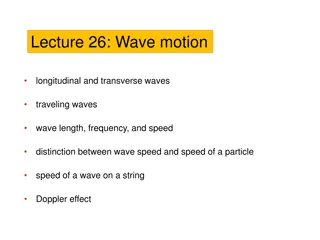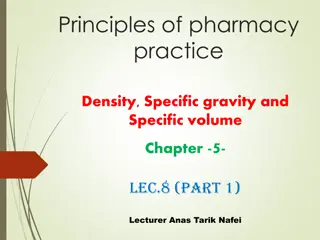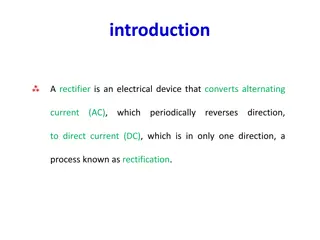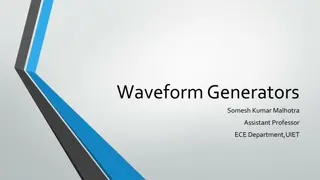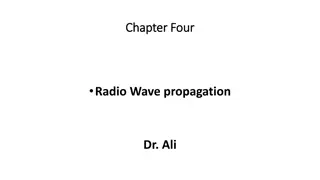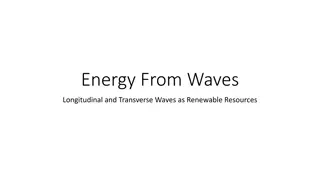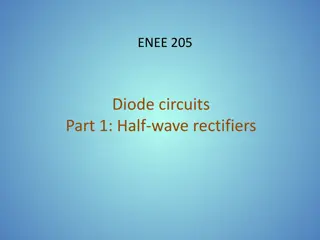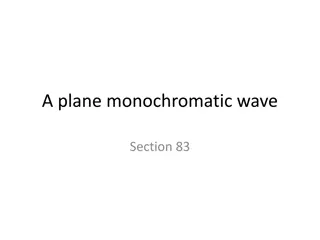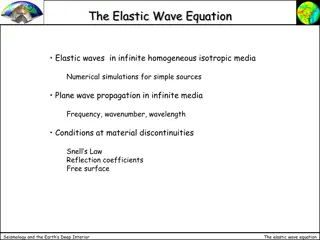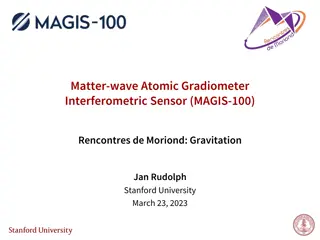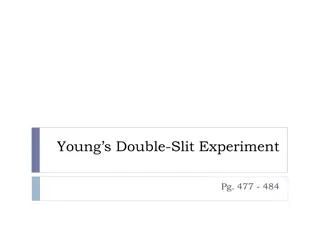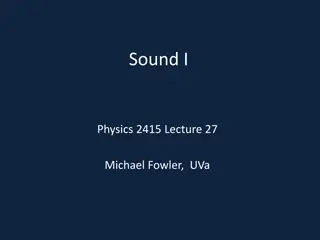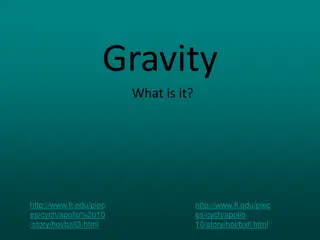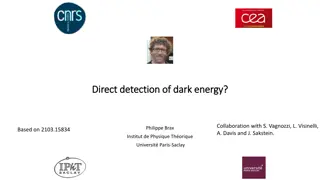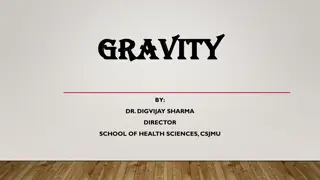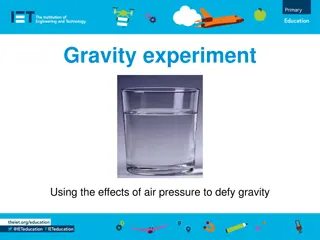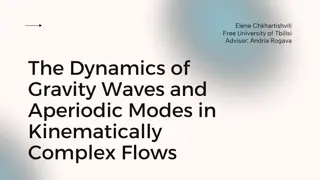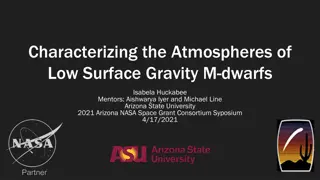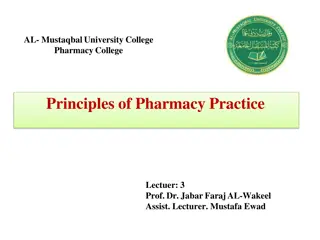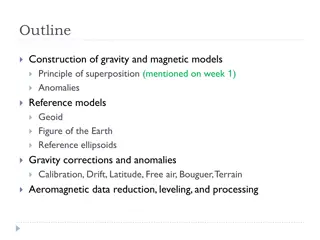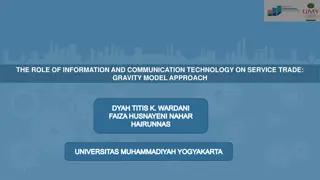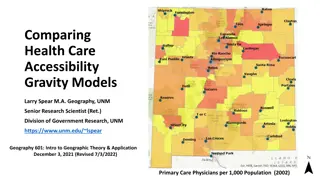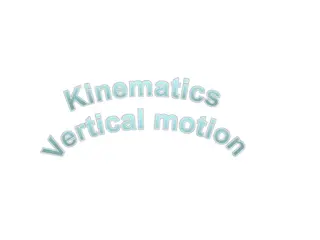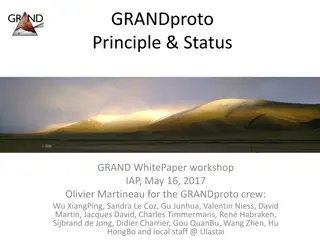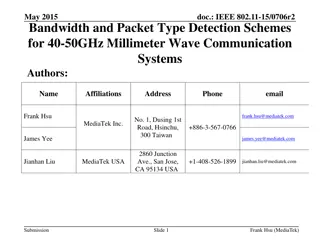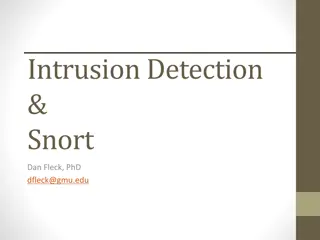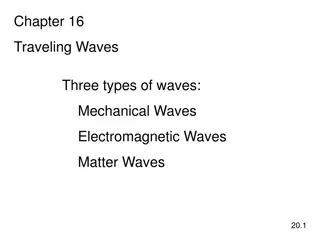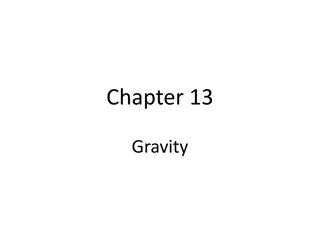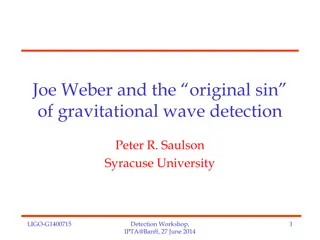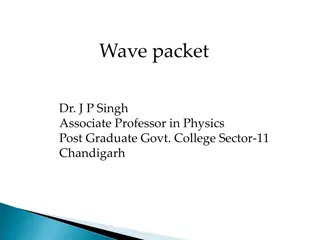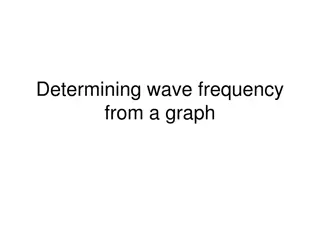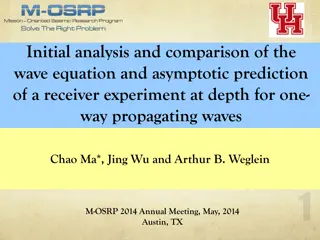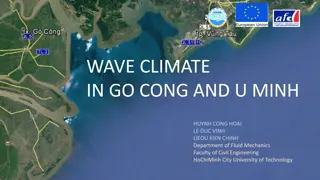Understanding Waves, Light, & Sound: Vocabulary and Concepts
This chapter covers essential vocabulary and concepts related to waves, light, and sound, including amplitude, crest, diffraction, Doppler effect, electromagnetic wave, frequency, interference, longitudinal wave, mechanical wave, medium, photon, pitch, reflection, refraction, sound wave, standing wa
8 views • 21 slides
Gravity in Space
Discuss the force of gravity, its impact on Earth and space, and how aerospace engineers utilize it. Learn why gravity is crucial in aerospace exploration and its effects on objects in space. Discover how gravity varies in different environments and its significance in space exploration.
1 views • 13 slides
Hydrologic Modeling Methods in HEC-HMS: A Comprehensive Overview
Explore the transformative methods within HEC-HMS hydrologic modeling, including unit hydrograph derivation, excess precipitation transformation, hydrograph illustration, surface transform methods, and concepts like the kinematic wave and 2D diffusion wave. Learn about the unit hydrograph, kinematic
2 views • 41 slides
Understanding Wave Motion: Longitudinal and Transverse Waves
Explore the fundamentals of wave motion including longitudinal and transverse waves, wave length, frequency, speed, and the Doppler effect. Learn about different types of waves, their characteristics, and the distinction between wave speed and the speed of a particle. Discover the properties of wave
2 views • 18 slides
Understanding Density and Specific Gravity in Pharmacy Practice
Density and specific gravity are important concepts in pharmacy practice for measuring mass and volume relationships of substances. Density is the mass per unit volume of a substance, usually expressed in grams per cubic centimeter, while specific gravity is the ratio of the weight of a substance to
0 views • 21 slides
Understanding Rectifiers: Types and Working Principles
A rectifier is a crucial electrical device that converts AC to DC, allowing current to flow in only one direction. Explore the different types of rectifiers like half-wave and full-wave, along with their working principles and efficiency considerations. Dive into the explanation of rectification pro
0 views • 15 slides
Understanding Waveform Generators in Electronic Circuits
Waveform generators, such as square wave oscillators and triangular wave generators, play crucial roles in electronic circuits. Square wave oscillators use capacitors and op-amps to create square wave outputs through charging and discharging processes. On the other hand, triangular wave generators u
1 views • 11 slides
Understanding Radio Wave Propagation in the Ionosphere
Radio wave propagation in the ionosphere is influenced by factors such as the radio refractive index and absorption of radio wave energy. This chapter delves into the interaction of radio waves with the ionosphere, discussing concepts like the electromagnetic spectrum nomenclature and the frequency
0 views • 15 slides
Harnessing Wave Energy: A Renewable Resource for Sustainable Power Generation
Utilizing the kinetic energy of ocean waves through transverse and longitudinal wave interactions, wave energy presents a promising renewable resource for electricity generation. This form of renewable energy, akin to wind power, involves converting the motion of waves into electrical power by deplo
0 views • 16 slides
Evolution of Light Theory: From Wave Theory to Quantum Theory
At the turn of the century, the discovery of the photoelectric effect challenged the wave theory of light, leading to the development of the quantum theory by Max Planck and Albert Einstein. This new theory introduced the concept of discrete energy units known as quanta, bridging the gap between wav
1 views • 62 slides
Understanding Gravity and Its Role in the Solar System
Explore the relationship of the Moon to Earth and the concept of gravity in the context of natural sciences for Grade 7 students. Learn about the center of gravity, the force of gravity, and the role gravity plays in the movement of celestial bodies within the solar system.
0 views • 6 slides
Understanding Diode Circuits: Half-Wave Rectifiers and Full-Wave Rectifiers
Diode circuits play a crucial role in converting AC signals to DC signals. This article covers the basics of diodes, half-wave rectifiers, and full-wave rectifiers. It explains the functioning of unfiltered and filtered rectifier circuits, highlighting the differences in ripple effects and voltage r
6 views • 18 slides
Understanding Complex Wavevectors in Homogeneous Media
Exploring the concept of complex wavevectors in a homogeneous medium, this content delves into monochromatic waves, Maxwell equations, wave propagation, and the relationship between material properties and wave behavior. It discusses how the complex nature of wavevectors impacts fields, damping, and
0 views • 17 slides
Understanding Elastic Wave Equations in Seismology
Explore the fundamentals of elastic wave equations for seismology, including topics such as plane wave propagation, reflection coefficients, and wavefield simplifications using curl and div operators. Learn about P-waves, shear waves, and elastodynamic potentials in the context of infinite homogeneo
0 views • 31 slides
Cutting-Edge Developments in Gravitational Wave Detection at MAGIS-100
Discover the groundbreaking MAGIS-100 Matter-Wave Atomic Gradiometer Interferometric Sensor, a 100-meter baseline atom interferometer under construction at Fermilab. Explore the mid-band science potential, sky localization precision, and long-baseline AI applications for gravitational wave detection
0 views • 15 slides
Understanding Young's Double-Slit Experiment and Interference Patterns
Thomas Young's double-slit experiment in the late 1700s provided evidence of light behaving as a wave, showcasing interference patterns. This experiment challenged the particle theory of light and supported the wave theory. The interference patterns observed helped scientists grasp the wave nature o
0 views • 27 slides
Proposal for Establishing an Umbrella Organization for Advanced Research and Development in Gravity Wave Detection
The proposal suggests the creation of an umbrella organization, GW3GRD, to coordinate international efforts in advancing research areas crucial for Gravity Wave detection. With a focus on avoiding duplicative research, promoting collaboration, and setting R&D priorities, the organization aims to dri
0 views • 6 slides
Understanding Sound Waves: Exploring Wave Phenomena in Physics
Delve into the intricacies of sound waves in Physics with a focus on standing waves, boundary conditions, amplitude variations, and wave interactions. Explore concepts like harmonic wave addition, pulse encounters, and outcomes at fixed and free ends of a string. Discover how different scenarios aff
0 views • 22 slides
Understanding Gravity and Forces in Physics
Gravity is a natural force that pulls objects towards the Earth's center, affecting how they fall based on mass. This presentation explores what gravity is, the impact of forces on objects, and how mass influences the effect of gravity. It demonstrates how objects like a bouncy ball and a marble fal
0 views • 8 slides
Insights into Dark Energy Detection and Gravity Tests
This collaboration delves into direct detection of dark energy, evidencing acceleration in expansion and delving into the evolution of background cosmology. Gravity tests, including solar system trials, are discussed, along with models like f(R) gravity and chameleon screening in the context of scal
0 views • 20 slides
Understanding Gravity and Center of Gravity in Physics
Gravity is the force of attraction between masses, such as Earth and objects. It gives weight to objects and has a magnitude of 32ft/s2 on Earth. The Center of Gravity (COG) is a hypothetical point where all mass appears concentrated. It plays a crucial role in determining how objects balance and mo
0 views • 13 slides
Gravity Experiment Using Air Pressure to Defy Gravity
Explore a fascinating gravity experiment utilizing the effects of air pressure to challenge gravity. Follow simple steps with visual aids to witness how a piece of card sticks to a glass filled with water when inverted. Understand the science behind this intriguing phenomenon and engage in hands-on
1 views • 5 slides
Exploring Gravity Waves and Aperiodic Modes in Kinematically Complex Flows
Delve into the dynamics of gravity waves and aperiodic modes in kinematically complex flows in this detailed study by Elene Chkhartishvili from Free University of Tbilisi. The research covers topics like internal gravity waves, main formalism, linearization of the velocity field, main equations, and
0 views • 16 slides
Characterizing the Atmospheres of Low Surface Gravity M-dwarfs
This study focuses on characterizing the atmospheres of low surface gravity M-dwarfs, which are promising hosts for exoplanets. The research delves into why low gravity M-dwarfs appear brighter in the infrared than typical M-dwarfs, presenting an improved base model with added opacities. The finding
0 views • 8 slides
Understanding Density, Specific Gravity, and Specific Volume in Pharmacy Practice
Explore the principles of density, specific gravity, and specific volume in pharmacy practice. Learn how to define and calculate these properties, apply specific gravity conversions, and understand the differences between density and specific gravity. Discover practical examples and calculations to
0 views • 24 slides
Understanding Gravity and Magnetic Models in Geophysics
Construction of gravity and magnetic models involves principles of superposition to isolate anomalies, reference ellipsoids, geoid, and various corrections like drift, latitude, free air, Bouguer, and terrain corrections. Gravity anomalies are determined by subtracting multiple factors from observed
0 views • 15 slides
The Role of ICT in Service Trade: Gravity Model Approach
Information and Communication Technology (ICT) plays a crucial role in international service trade, with the application of the gravity model theory to analyze the flow of trade. This study explores how technology, particularly ICT, influences service trade within the ASEAN region. It delves into th
0 views • 21 slides
Comparing Health Care Accessibility Gravity Models in Geographic Theory
This study by Larry Spear, a Senior Research Scientist at UNM, delves into the concept of spatial interaction and the application of gravity models in analyzing health care accessibility. It discusses the development and comparison of one-step and two-step gravity models, addressing the issue of pat
3 views • 12 slides
Understanding Vertical Motion and Gravity in Kinematics
Explore the principles of vertical motion and gravity in kinematics through scenarios involving throwing objects, free-fall motion, and calculating heights. Learn how to model vertical motion with acceleration due to gravity, find maximum heights of thrown objects, solve extended problems, and under
2 views • 12 slides
Understanding Sedimentation in Water Treatment Processes
Sedimentation is a crucial unit operation in water treatment involving the settling of solids in liquids to form sediments. Gravity plays a key role in this process, drawing particles towards the bottom of the vessel. Differentiating between settling and sedimentation is important, with settling bei
2 views • 14 slides
Overview of GRANDproto Project Workshop on Autonomous Radio Detection
GRANDproto project workshop held in May 2017 focused on improving autonomous radio detection efficiency for the detection of extensive air showers (EAS). Issues such as detector stability and background rates were discussed, with the goal of establishing radio detection as a reliable method for EAS
1 views • 14 slides
Bandwidth and Packet Type Detection Schemes for 40-50GHz Millimeter Wave Communication Systems
The document discusses bandwidth and packet type detection schemes for 40-50GHz millimeter wave communication systems in IEEE 802.11aj specifications. It proposes a preamble design for auto-detection of bandwidth and packet type to improve channel estimation and decoding efficiency. By utilizing dif
0 views • 27 slides
Understanding Intrusion Detection Systems (IDS) and Snort in Network Security
Intrusion Detection Systems (IDS) play a crucial role in network security by analyzing traffic patterns and detecting anomalous behavior to send alerts. This summary covers the basics of IDS, differences between IDS and IPS, types of IDS (host-based and network-based), and the capabilities of Snort,
0 views • 34 slides
Understanding Traveling Waves: Types, Properties, and Equations
Explore the world of traveling waves, including mechanical, electromagnetic, and matter waves. Learn about transverse and longitudinal wave motion, the speed of waves in strings, wave frequency, wavelength, and speed relationships, as well as wave equations for non-repeating waves over space and tim
1 views • 30 slides
Understanding Gravity and its Applications
Explore the fascinating world of gravity through topics like the law of gravity, gravitational force, superposition, and more. Dive into concepts such as net gravitational force, acceleration due to gravity, and gravitational forces in various scenarios. Understand how gravity influences objects in
0 views • 68 slides
The Legacy of Joe Weber in Gravitational Wave Detection
Joe Weber, a key figure in the history of gravitational wave detection, made significant original contributions to the field, despite facing conflicts and challenges. His groundbreaking work laid the foundation for future advancements in the detection of gravitational waves. The story of Joe Weber's
1 views • 19 slides
Understanding Wave-Particle Duality in Physics
Explore the complex relationship between particles and waves in physics, as particles exhibit wave-like behavior described by wave packets rather than single waves. Delve into the concept of group velocity and phase velocity, and how a particle's behavior is represented by a wave function. Uncover t
1 views • 12 slides
Understanding Wave Frequency and Periodicity Graphically
This instructional material provides a visual guide on determining wave frequency and period from graphs displaying wave cycles over time. It explains concepts such as the relationship between cycles and time, measuring frequency in Hertz (Hz), understanding wave periods, and calculating frequencies
0 views • 25 slides
Analysis and Comparison of Wave Equation Prediction for Propagating Waves
Initial analysis and comparison of the wave equation and asymptotic prediction of a receiver experiment at depth for one-way propagating waves. The study examines the amplitude and information derived from a wave equation migration algorithm and its asymptotic form. The focus is on the prediction of
0 views • 23 slides
Study on Wave Climate in Go Cong and U Minh Regions
This study focuses on analyzing the wave climate in Go Cong and U Minh areas in Vietnam using the Telemac-Tomawac wave model. The research covers the simulation of wind-wave characteristics in the East Sea and West South Sea over a 3-year period. Data input, model setup, calibration, and computed do
1 views • 27 slides



